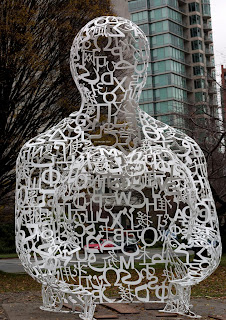In Night Operation, Barfield offers advice for those suffering from "library-terror," that feeling that there is endless recorded knowledge in the world but nowhere to begin to understand it. Barfield's remedy is "to keep following always one particular thread of inquiry"—presumably with an inkling that eventually anything will lead to everything or at least to everything you need to know. Almost as long as I can remember, I have followed a thread. I have been in pursuit of something, something I knew not what and I have come to believe that this pursuit is coeternal with my being. The experience of receiving what I needed to receive when I needed to receive it, most commonly through reading but also through hearing or even mishearing, from thinking, being told or through what seemed an unbidden insight, is an experience that I cannot deny. It is not correct to conclude from this that my mind did not grow through direct experience. Alert receptivity (when we manage to achieve it) is the definition of direct experience, whether of art, nature, intellect, love or heartbreak.
One could argue, however, that I cannot step outside of my life to evaluate how it, how I would be now had I learned one thing when, in fact, I learned another. It is possible to conclude that, of course, everything seems as it should be because that is how it is. I know and love my life as it is. Had it been different, I would have loved that life, too. To that, I answer that my life is an unfolding, and just as it is possible to discipline ourselves to see becoming, to see not a leaf but leaf-ing, not natura naturata but natura naturans, I can learn to see—even to quite literally see—the thread of my life as the thread of my Self. For his part, Barfield looked forward to a time when ""a man is no longer regarded as a lunatic who divines that the things which happen to a person, and the order in which they happen, may be as much a part of him as his physical organism."
I am not an object acted upon, am not distinct from what happens to me, what occurs "in" my life. I am what I seek. I am what I learn—the serendipities and the disappointments. I am what I am coming to know and this is much larger than the appearance of myself as phenomenon. In What Coleridge Thought, Barfield explains that Coleridge, often accused of plagiarism, did not generally "borrow" the ideas of others but "adopted" them. The difference is that, in borrowing, one merely apes the insights of another. In adopting, the ideas come alive in one's self. One mind rises up to meet another in Mind. It is possible to adopt only what had been on the tip of one's own tongue to begin with. From this understanding, it is a short step to realize Coleridge's imperative that we should recognize our own creative activity as the creative activity of the Universe. Just as it is possible, as Steiner did, to think of a butterfly as "a flower liberated from its stalk," it is possible to experience Life, the same Life that animates everything else, transmuting itself, displaying itself, reveling in itself through me—through each and all of us all the time.
Many, many blessings for the New Year!














